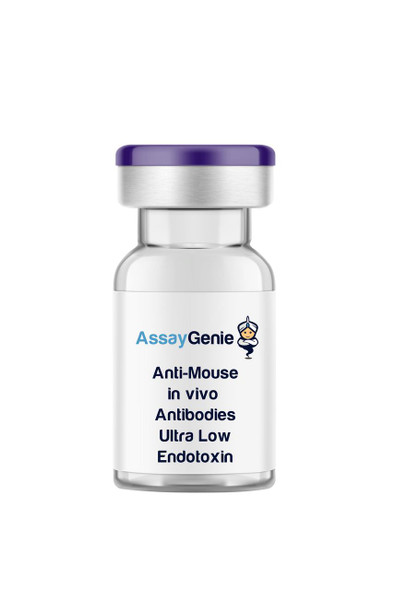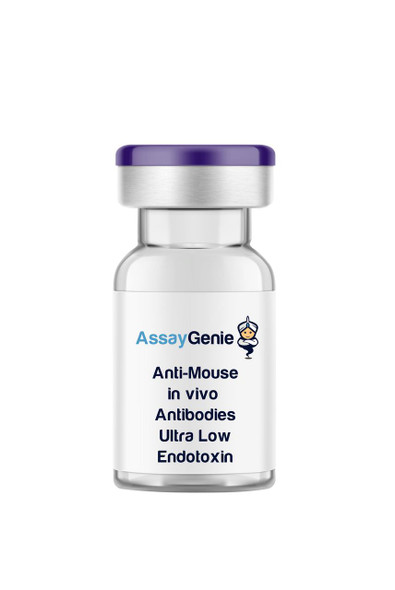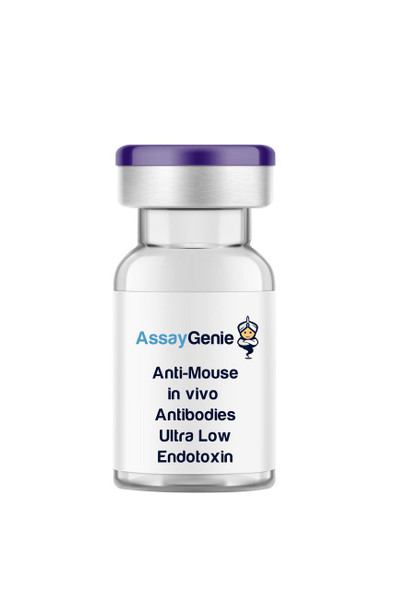Anti-Mouse CD120a (TNFR1) [55R-593] In Vivo Antibody - Ultra Low Endotoxin
- SKU:
- IVMB0145
- Product Type:
- In Vivo Monoclonal Antibody
- Clone:
- 55R-593
- Protein:
- Tumor Necrosis Factor Receptor I
- Isotype:
- Armenian Hamster IgG
- Reactivity:
- Mouse
- Synonyms:
- TNFR-I
- TNFRSF1A
- P55
- P60
- Research Area:
- Immune Checkpoint & Cancer Biology
- Endotoxin Level:
- Ultra Low Endotoxin
- Host Species:
- Armenian Hamster
- Applications:
- FC
- IP
- WB
Description
| Product Name: | Anti-Mouse CD120a (TNFR1) [55R-593] In Vivo Antibody - Ultra Low Endotoxin |
| Product Code: | IVMB0145 |
| Size: | 1mg, 5mg, 25mg, 50mg, 100mg |
| Clone: | 55R-593 |
| Protein: | Tumor Necrosis Factor Receptor I |
| Product Type: | Monoclonal Antibody |
| Synonyms: | TNFR-I, TNFRSF1A, P55, P60 |
| Isotype: | Armenian Hamster IgG |
| Reactivity: | Mouse |
| Immunogen: | E. coli-expressed extracellular domain of the mouse TNFRI protein |
| Applications: | FC, IP, WB |
| Formulation: | This monoclonal antibody is aseptically packaged and formulated in 0.01 M phosphate buffered saline (150 mM NaCl) PBS pH 7.2 - 7.4 with no carrier protein, potassium, calcium or preservatives added. |
| Endotoxin Level: | <0.5 EU/mg as determined by the LAL method |
| Purity: | ≥98% monomer by analytical SEC >95% by SDS Page |
| Preparation: | Functional grade preclinical antibodies are manufactured in an animal free facility using only In vitro protein free cell culture techniques and are purified by a multi-step process including the use of protein A or G to assure extremely low levels of endotoxins, leachable protein A or aggregates. |
| Storage and Handling: | Functional grade preclinical antibodies may be stored sterile as received at 2-8°C for up to one month. For longer term storage, aseptically aliquot in working volumes without diluting and store at -80°C. Avoid Repeated Freeze Thaw Cycles. |
| Applications: | FC, IP, WB |
| Recommended Usage: | FC WB |
| Reactivity: | Mouse |
| Host Species: | Armenian Hamster |
| Specificity: | Clone 55R-593 recognizes mouse CD120a. |
| Antigen Distribution: | CD120a is constitutively expressed in most tissues. |
| Immunogen: | E. coli-expressed extracellular domain of the mouse TNFRI protein |
| Concentration: | ≥ 5.0 mg/ml |
| Endotoxin Level: | <0.5 EU/mg as determined by the LAL method |
| Purity: | ≥98% monomer by analytical SEC >95% by SDS Page |
| Formulation: | This monoclonal antibody is aseptically packaged and formulated in 0.01 M phosphate buffered saline (150 mM NaCl) PBS pH 7.2 - 7.4 with no carrier protein, potassium, calcium or preservatives added. |
| Preparation: | Functional grade preclinical antibodies are manufactured in an animal free facility using only In vitro protein free cell culture techniques and are purified by a multi-step process including the use of protein A or G to assure extremely low levels of endotoxins, leachable protein A or aggregates. |
| Storage and Handling: | Functional grade preclinical antibodies may be stored sterile as received at 2-8°C for up to one month. For longer term storage, aseptically aliquot in working volumes without diluting and store at -80°C. Avoid Repeated Freeze Thaw Cycles. |
CD120 can refer to two members of the tumor necrosis factor receptor superfamily- CD120a (TNFR1) or CD120b (TNFR2). CD120a is a 55kD Type I transmembrane protein receptor that binds both TNF-α and TNF-β (LT-α). In association with TRADD and RIP, the receptor crosslinking induced by TNF-α or TNF-β trimers is vital for signal transduction, leading to apoptosis, NF-\uf06bB activation, increased expression of proinflammatory genes, tumor necrosis, and cell differentiation depending on cell type and differentiation state. CD120b is a 75 kD type I transmembrane protein that binds both TNF-α and TNF-β. In conjunction with TRAF1 and TRAF2, the receptor crosslinking induced by TNF-α or TNF-β trimers is critical for signal transduction that may lead to apoptosis, NF-kB activation, increased expression of proinflammatory genes, tumor necrosis, and cell differentiation depending on cell type and differentiation state. TNF-α is a 17.5 kD protein that mediates inflammation and immunity caused by the invasion of viruses, bacteria, and parasites by initiating a cascade of cytokines that increase vascular permeability, thus bringing macrophages and neutrophils to the site of infection. TNF-α secreted by the macrophage causes the blood to clot which provides containment of the infection. TNF-α binding to surface receptors brings about various biologic activities that include cytolysis and cytostasis of many tumor cell lines In vitro, hemorraghic necrosis of tumors In vivo, increased fibroblast proliferation, and enhanced chemotaxis and phagocytosis in neutrophils. TNF-β (LT-α) is a 25 kD protein that has a significant impact on the maintenance of the immune system including the development of secondary lymphoid organs. TNF-β has dual functions. It may function to prevent growth of cancer cells or it may facilitate the development of tumors. TNF-β is involved in the regulation of cell survival, proliferation, differentiation, and apoptosis and, if unregulated, can result in a constantly active signaling pathway, resulting in uncontrolled cellular growth and creation of tumors. Additionally, TNF-β is involved in innate immune regulation and has been shown to prevent tumor growth and obliterate cancerous cell lines.
| Technical Datasheet: | View |
| Protein: | Tumor Necrosis Factor Receptor I |
| Function: | Apoptosis, NF-κB activation, inflammation, tumor necrosis, cell differentiation |
| Ligand/Receptor: | TNF-α, LT-α (TNF-β) |
| Research Area: | Immunology, Innate Immunity |

| Armenian Hamster IgG Isotype Control | |
|---|---|
| Clone | PIP |
| Isotype | Armenian Hamster IgG1 |
| Endotoxin Level | Ultra Low Endotoxin |
Meet the team!
Shane Costigan
Territory Manager & Team Lead
Abdul Khadim
Sales Executive

![Anti-Mouse CD120a (TNFR1) [55R-593] In Vivo Antibody - Ultra Low Endotoxin Anti-Mouse CD120a (TNFR1) [55R-593] In Vivo Antibody - Ultra Low Endotoxin](https://cdn11.bigcommerce.com/s-39x6lpnvxv/images/stencil/608x608/products/119893/118076/anti-mouse-cd120a-tnfr1-55r-593-in-vivo-antibody-ultra-low-endotoxin__45317__62384.1698937763.jpg?c=1)
![Anti-Mouse CD120a (TNFR1) [55R-593] In Vivo Antibody - Low Endotoxin Anti-Mouse CD120a (TNFR1) [55R-593] In Vivo Antibody - Low Endotoxin](https://cdn11.bigcommerce.com/s-39x6lpnvxv/images/stencil/590x590/products/119891/118074/anti-mouse-cd120a-tnfr1-55r-593-in-vivo-antibody-low-endotoxin__98959__02075.1698937762.jpg?c=1)
![Anti-Mouse CD120a (TNFR1) [55R-170] In Vivo Antibody - Ultra Low Endotoxin Anti-Mouse CD120a (TNFR1) [55R-170] In Vivo Antibody - Ultra Low Endotoxin](https://cdn11.bigcommerce.com/s-39x6lpnvxv/images/stencil/590x590/products/119892/118075/anti-mouse-cd120a-tnfr1-55r-170-in-vivo-antibody-ultra-low-endotoxin__51795__33042.1698937762.jpg?c=1)
![Anti-Mouse CD120a (TNFR1) [55R-170] In Vivo Antibody - Low Endotoxin Anti-Mouse CD120a (TNFR1) [55R-170] In Vivo Antibody - Low Endotoxin](https://cdn11.bigcommerce.com/s-39x6lpnvxv/images/stencil/590x590/products/119890/118073/anti-mouse-cd120a-tnfr1-55r-170-in-vivo-antibody-low-endotoxin__20332__33712.1698937761.jpg?c=1)





